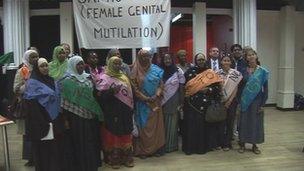Bristol's NHS launches anti-female genital mutilation campaign
- Published

Some 2,000 girls in the city are thought to be at risk of being forced to undergo female genital mutilation
The latest campaign against Female Genital Mutilation (FGM) in Bristol has been launched by the city's safeguarding children's board.
Some 2,000 girls in the city are thought to be at risk of FGM, which can cause fatal blood infections, urinary incontinence and chronic pain.
It is illegal for British nationals or permanent residents to be taken to another country for the procedure.
However, girls are regularly taken abroad to undergo FGM during the summer.
FGM is carried out in more than 28 countries, including those in Asia, the Middle East, and parts of Africa, including Somalia and Sudan.
According to the city council, Bristol is thought to have the UK's third largest Somali population, outside London and Birmingham.
Aiding and abetting the crime can lead to 14 years in prison, but there is yet to be a prosecution in the UK.
'Haven't changed'
Dave McCallum used to lead the public protection unit of Avon and Somerset Police and is a trustee of Integrate Bristol, a charity that helps young people from other countries integrate and adapt.
He said: "The whole process needs to work for the police to get the information they need to act upon.
"Members of the community have not been passing this on as they really ought to."
Nimco Ali, co-founder of campaign group Daughters of Eve, agreed communities were not reporting FGM.
She said the organisation worked to try and make senior figures in the public sector take the problem seriously.
"The onus falls on the public sector as opposed to waiting for those who are perpetuating the crime to report the crime themselves," she said.
"The community haven't changed their position on FGM, they say it's something they're going to carry on doing."
- Published30 March 2012
- Published29 July 2011